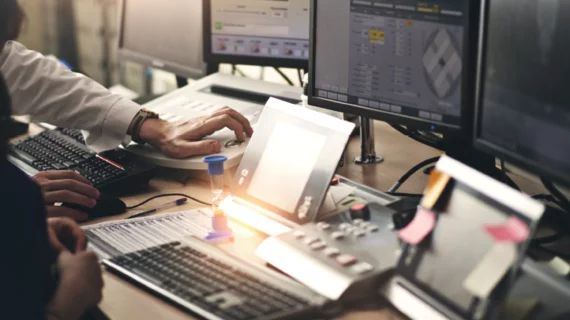Automated CO-RADS algorithm spots COVID-19 patients, may relieve overworked radiologists
Hospitals in many states are reporting surging COVID-19 numbers, pushing some radiology departments to maximum capacity. But experts believe their new artificial intelligence-based reporting algorithm can offer much-needed relief.
Physicians from the Netherlands introduced their COVID-19 Reporting and Data System, known as CO-RADS, back in April. They proved the tool accurately offers clinicians a standardized process for assessing pulmonary involvement in CT scans.
And in a new study published July 30 in Radiology, experts from the same Dutch institution developed an artificial intelligence-based CO-RADS system, showing this method can identify which patients may have the disease based on their chest CT scans.
The AI technique also aligned with radiologists’ predictions and should have a significant impact on care during this pandemic, Nikolas Lessmann, with Radboud University Medical Center’s Department of Radiology, Nuclear Medicine and Anatomy, and colleagues wrote.
“We believe the AI system may be of use to support radiologists in standardized CT reporting during busy periods,” the authors added. “The automatically assessed CT severity scores per lobe may have prognostic information and could be used to quantify lung damage, also during patient follow-up.”
The group developed their model using 520 CT scans from a single institution taken from more than 450 patients. Subsequently Lessmann et al. tested their AI on an internal dataset of 105 patients and an external group of 262. Individuals received an unenhanced CT exam due to clinical suspicion of COVID-19.
Compared to eight expert radiologists’ manual readings, CO-RADS-AI accurately spotted patients infected with the novel virus, notching an area under the curve score of 0.95 in the test set. That dipped slightly when ran on external data (AUC of 0.88). The authors said a federated learning approach could help boost its performance on outside images.
Additionally, the automated tool accurately assigned pulmonary involvement scores within one CO-RADS category in 81% of cases. In 94% of patients, it came within one CT severity score point per lobe, compared to the trained rads.
“Our study demonstrates that an AI system can identify COVID-19 positive patients based on unenhanced chest CT images with diagnostic performance comparable to that of radiological observers,” the authors concluded. “It is noteworthy that the algorithm was trained to adhere to the CO-RADS categories and is thus directly interpretable by radiologists.”

